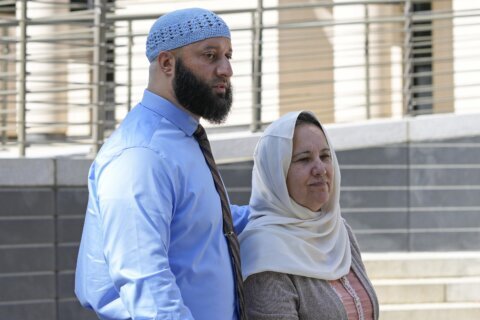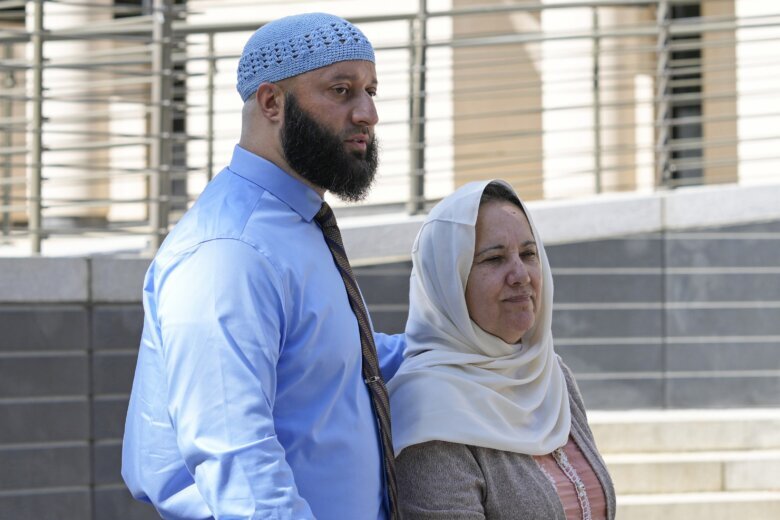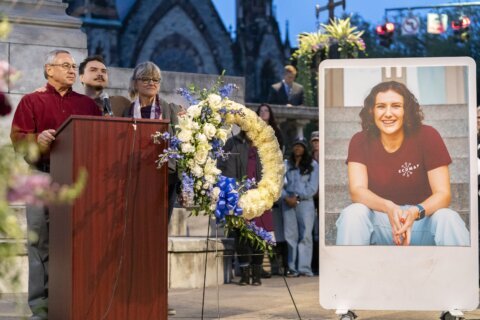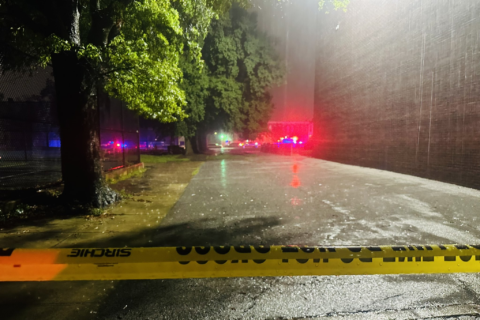
ANNAPOLIS, Md. (AP) — Adnan Syed’s murder conviction still stands after Maryland’s highest court Friday ordered a redo of the hearing that freed him. The court ruled that the earlier proceeding violated the rights of the victim’s family, marking the latest development in a legal saga that gained widespread attention through the hit podcast “Serial.”
The 4-3 ruling upheld an appellate court decision that reinstated Syed’s conviction last year. It comes about 11 months after the court heard arguments in a case that has been fraught with legal twists and divided court rulings since Syed was convicted in 2000 of killing his high school ex-girlfriend Hae Min Lee.
The justices said that Syed, who was released from prison in 2022, can remain free as the case heads to a new lower court judge to again consider whether his conviction should be tossed.
The court weighed the extent to which victims can participate in hearings where a conviction could be vacated. The majority of judges concluded that, in an effort to remedy what they deemed an injustice to Syed, prosecutors and a lower court “worked an injustice” against Lee’s brother. The court ruled that Young Lee was not treated with “dignity, respect, and sensitivity,” as required under Maryland law, because he wasn’t given reasonable notice of the hearing that freed Syed.
The court said those shortfalls would be corrected leading up to the new hearing.
But the exact next steps remain unclear, in part because Baltimore elected a new top prosecutor in 2022, which could change how that office handles the case. State’s Attorney Ivan Bates said his office is reviewing the ruling and declined to immediately comment further.
In a dissenting opinion, Justice Michele Hotten argued the issue was moot because the underlying charges no longer exist.
“This case exists as a procedural zombie,” Hotten wrote. “It has been reanimated, despite its expiration. The doctrine of mootness was designed to prevent such judicial necromancy.”
The sprawling case has most recently pitted criminal justice reform efforts against the legal rights of crime victims and their families, whose voices are often at odds with a growing movement to acknowledge and correct systemic issues, including historic racism, police misconduct and prosecutorial missteps.
David Sanford, an attorney who represents the victim’s family, said the ruling “acknowledges what Hae Min Lee’s family has argued: Crime victims have a right to be heard in court.”
Erica Suter, Syed’s attorney, said in a statement that the court reached a decision “we could not disagree with more.”
“Wrongful convictions devastate the wrongly accused, their family, and the family of the victim,” Suter said. “Reinstating Adnan’s wrongful conviction does not provide Hae Min Lee’s family with justice or closure, and it takes a tremendous amount of emotional toll on Adnan’s family, who already lost a son and brother for more than two decades.”
Syed, 43, has maintained his innocence and has often expressed concern for Lee’s surviving relatives. The teenage girl was found strangled to death and buried in an unmarked grave in 1999. Syed was sentenced to life in prison, plus 30 years.
He was released from prison in September 2022 when a Baltimore judge overturned his conviction in response to a request from Baltimore prosecutors who said they found flaws in the evidence.
However, in March 2023, the Appellate Court of Maryland, the state’s intermediate appellate court, ordered a redo of the hearing that won Syed his freedom and reinstated his conviction. The court said the victim’s family didn’t receive adequate notice to attend the hearing in person.
Suter, Syed’s lawyer, has argued that the state did meet its obligation by allowing Young Lee to participate in the hearing via video conference.
Syed appealed his conviction’s reinstatement, and the Lee family also appealed to the Maryland Supreme Court, arguing crime victims should be given a larger role in the process.
Syed has remained free as the latest appeals wound their way through the state court system.
During oral arguments last year, his attorneys argued the Lee family’s appeal was moot because prosecutors decided not to charge him again after his conviction was vacated. And even if her brother’s rights were violated, the attorneys argued, he hasn’t demonstrated whether the alleged violation would have changed the outcome of the hearing.
This wasn’t the first time Maryland’s highest court has taken up Syed’s protracted legal odyssey.
In 2019, a divided court ruled 4-3 to deny Syed a new trial. A lower court had ordered a retrial in 2016 on grounds that Syed’s attorney, Cristina Gutierrez, didn’t contact an alibi witness and provided ineffective counsel. Gutierrez died in 2004. In November 2019, the U.S. Supreme Court declined to review the decision by Maryland’s top court.
More recently, Baltimore prosecutors reexamined Syed’s files under a Maryland law targeting so-called “juvenile lifers” because he was 17 when Hae Min Lee’s body was found. Prosecutors uncovered numerous problems, including alternative suspects and the unreliable evidence presented at trial.
Instead of reconsidering his sentence, prosecutors filed a motion to vacate Syed’s conviction entirely. They later chose not to recharge him after receiving the results of DNA testing that was conducted using more modern testing techniques than initially conducted. DNA recovered from Lee’s shoes excluded Syed as a suspect, prosecutors said.
Syed’s case was chronicled in the “Serial” podcast, which debuted in 2014 and drew millions of listeners who became armchair detectives as the series analyzed the case. The show, hosted by veteran radio producer Sarah Koenig, transformed the true-crime genre as it shattered podcast-streaming and downloading records, revealing little-known evidence and raising new questions about the case.
Copyright © 2024 The Associated Press. All rights reserved. This material may not be published, broadcast, written or redistributed.







